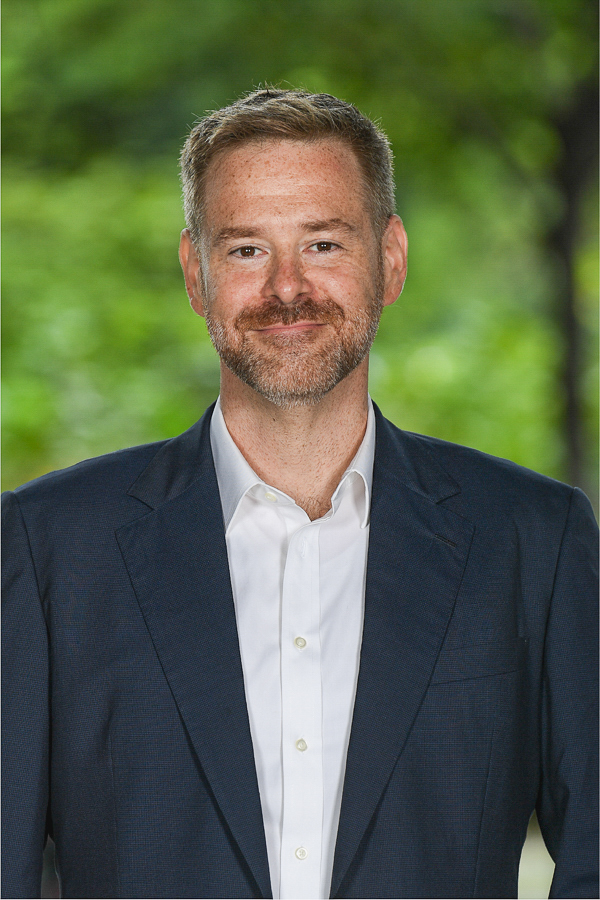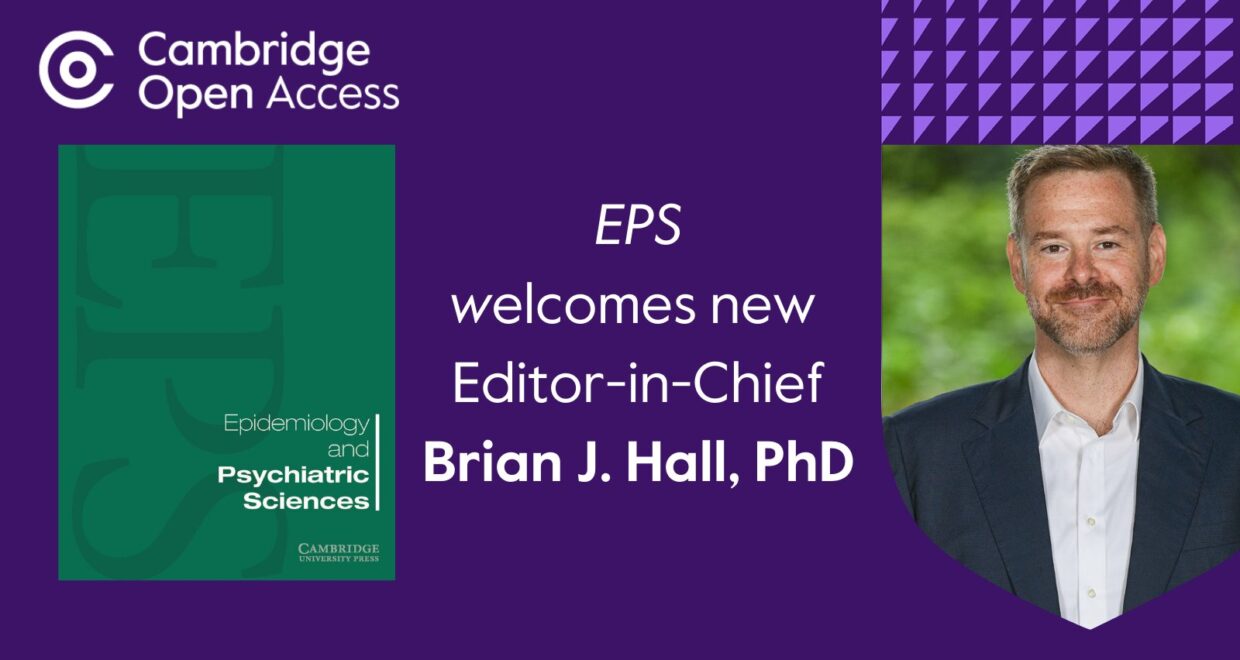Introducing the New Editor-in-Chief of Epidemiology and Psychiatric Sciences: Professor Brian J. Hall
What is your background and how did your involvement with Epidemiology and Psychiatric Epidemiology start?

I am a clinical psychologist and psychiatric epidemiologist, currently serving as Professor of Global Public Health at NYU Shanghai, Affiliated Professor in the Department of Global and Environmental Health at the NYU School of Global Public Health, and the Founding Director of the NYU Shanghai Center for Global Health Equity. Originally from the United States, I completed my PhD in Clinical Psychology at Kent State University, my clinical internship as an NIH T32 predoctoral Fellow in Traumatic Stress the Charleston Consortium Psychology Internship Program of the Medical University of South Carolina, followed by NIMH T32 sponsored postdoctoral training fellowship in psychiatric epidemiology at the Johns Hopkins Bloomberg School of Public Health. I then moved overseas as the last Fogarty Global Health Fellow to China, to expand my migration and health research at the Center for Migrant Health Policy at Sun Yat-sen University in Guangzhou, as a part of UNC Project China and the UNC Center for Global Health and Infectious Disease. My research has focused on understanding and addressing the social determinants of mental ill health, with particular attention to vulnerable populations and underserved communities in Asia and globally. I am keenly aware of the importance of culture and setting as critical factors in the experience of mental ill health and the need for culturally appropriate and localised research to address these issues.
As the first Global Mental Health Fellow of the World Health Organisation, I co-developed the cultural sections of the ICD-11 and further served on the DSM-5-TR committee on Culture and Mental Health, along with my work to culturally adapt and trial the WHO digital mental health intervention Step-by-Step. I have participated in WHO work to develop the Regional Framework for Mental Health in the Western Pacific and the Regional Research Agenda on Health, Migration, and Displacement (and within the Context of Climate Change) also in the Western Pacific.
I first engaged with Epidemiology and Psychiatric Epidemiology as a contributor, drawn by its emphasis on methodologically rigorous work that bridges epidemiology and psychiatry. Over time, the journal became a home for my research and a source of inspiration through the impactful work of colleagues around the world. My involvement with Epidemiology and Psychiatric Sciences expanded in 2023, when I joined the journal as a Senior Associate Editor. From that vantage point, I became deeply familiar with the journal’s mission, editorial team, and its distinct role in bridging psychiatric science and public mental health. I am now deeply honored to take up the role of Editor-in-Chief, following the outstanding leadership of Professor Corrado Barbui. I look forward to building on an already strong foundation to ensure the journal remains inclusive, methodologically rigorous, and at the forefront of the field of psychiatric epidemiology and public mental health research.
How would you describe the journal’s scope?
Epidemiology and Psychiatric Epidemiology is a leading journal that sits at the intersection of psychiatric science, epidemiology, and public mental health. Its scope encompasses population-based mental health research, intervention trials, studies on the social and structural determinants of psychiatric outcomes, and innovations in measurement and methodology. The journal values both applied and theoretical contributions and is distinguished by its global perspective—welcoming studies that reflect the rich diversity of mental health experiences across settings and cultures. What draws me to the journal is its commitment to being both scientifically rigorous and socially relevant. It encourages research that not only advances theory and methods but also informs policy, service delivery, and mental health care globally.
What are your aims and objectives for the journal?
As Editor-in-Chief, my primary aim is to position EPS as the go-to journal for the latest and most influential research in psychiatric epidemiology and public mental health. I want to ensure that the journal is a platform for innovation, dialogue, and global collaboration. My vision is to maintain and further elevate the journal’s scientific quality while expanding its reach into new regions, particularly in low- and middle-income countries where the burden of mental health problems is high, yet under-researched. I’m particularly committed to fostering work that engages with issues of equity, resilience, and lived/living experience-with broad geographic representation. Understanding the critical role of mentorship in fostering the next generation, I will also be keen to establish pathways for early career researchers and trainees to participate in the journal as well.
I also want to ensure EPS is a welcoming home for mixed-methods research, including qualitative inquiry that amplifies people’s voices alongside large-scale quantitative studies. I see EPS as a journal that supports a wide array of methods and approaches, united by a shared commitment to understanding and improving population mental health. Working closely with our editorial board and contributors, I hope to ensure that Epidemiology and Psychiatric Epidemiology remains at the forefront of the field: a trusted venue for thought-provoking, high-impact research that informs practice and policy.
Why should people submit to Epidemiology and Psychiatric Epidemiology?
Epidemiology and Psychiatric Epidemiology is a dynamic, forward-looking journal committed to high-quality, impactful research. It provides a platform for studies that engage with real-world complexity while maintaining strong methodological foundations. Its global outlook makes it a natural home for research that transcends traditional boundaries—whether geographic, disciplinary, or conceptual.
Authors will find a supportive, thoughtful editorial process, and a readership that values both innovation and clarity. If your work explores how social, structural, and environmental factors shape mental health—and if you are committed to rigorous, equity-focused science—then I warmly invite you to submit your work to the journal.
A global outlook
We would like to thank Prof. Hall for sharing his vision and passion for Epidemiology and Psychiatric Sciences. A global perspective shapes Prof. Hall’s work. Having lived and worked in China for over 12 years and led and participated in projects across Asia, Europe, Sub-Saharan Africa, the Middle East, and the Americas, he brings a truly international lens to EPS. He is uniquely positioned to expand EPS’s international scope, visibility, and impact.
Under his leadership, we look forward to the journal continuing to grow as a trusted and innovative platform for global research on psychiatric epidemiology and public mental health. His deep commitment to global mental health equity, methodological rigor, and inclusive science promises to guide the journal into an exciting new chapter.
We also invite readers to learn more about Professor Hall’s work at the NYU Shanghai Center for Global Health Equity, where interdisciplinary teams collaborate to advance scalable, culturally responsive solutions to global mental health challenges.
Stay tuned for upcoming initiatives and special issues from the journal and consider joining us in our shared mission to advance the science of psychiatric epidemiology and public mental health around the world.
For Wechat Center official account:

Epidemiology and Psychiatric Sciences is an international, peer-reviewed journal publishing Open Access from 2020. Formerly published as Epidemiologia e Psichiatria Sociale, established in 1992 by Michele Tansella, the journal gives priority to highly relevant and innovative research articles and systematic reviews in the areas of public mental health and policy; mental health services, system research; and epidemiological and social psychiatry. Visit cambridge-org.demo.remotlog.com/eps to learn more.






